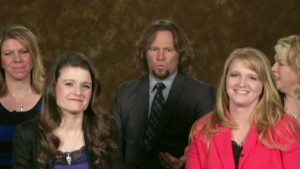Editor's note: Janet W. Hardy, a writer, editor and consultant, has published 11 books, including the best-selling, "The Ethical Slut: A Practical Guide to Polyamory, Open Relationships and Other Adventures." She has taught workshops about alternative sexualities and relationships all over the world.
(CNN) -- I grew up in the early 1960s in an affluent suburb on the East Coast. Every child I knew went home to a family that looked like mine: a mom at home waiting for us, and a dad who showed up a few hours later in time for dinner.
How tempting it is to remember such households as an ideal and universal norm. But they were rarely ideal, and they were never universal.
Let's not discuss the stresses that affected those nuclear families. Let's just talk about the innumerable people who, by virtue of race, background, health or circumstance, could not -- or did not want to -- live in such families.
 Janet W. Hardy
Janet W. Hardy Instead, they lived in single-parent households, in households with two men or two women, in extended families of grandparents and aunts and grown siblings, in households where multiple adults pooled money and skills to make ends meet, and in many other configurations.
Back then, it never occurred to the people I knew to call those configurations "families." Today, in a more tolerant era, that old standard of the nuclear family is still encoded in our laws and our tax code, as well as in the antiquated and judgmental phrase "family values."
Among my own circle of acquaintances, I hold many "alternative families" close to my heart:
-- A man and two women who have been raising their two children together from infancy through high school.
-- Three men who have shared a loving household for nearly 20 years.
-- A "core couple," married for many decades, who have consistently surrounded themselves with long-term, live-in lovers.
-- Two couples who share a duplex and a busy and intermingled sex life.
-- A long-partnered gay man and lesbian woman who together brought a third, lesbian woman into their household because the female half of the pair missed that part of her life.
There are as many configurations of genders, ages and numbers as you can imagine. These are families as surely as any family you've welcomed into your neighborhood. They share property, raise children, tend to their homes and communities.
 4 'sister wives' fight to live together
4 'sister wives' fight to live together  Is ruling good for polygamist women?
Is ruling good for polygamist women? Last month, in a case involving the plural family portrayed on the reality show "Sister Wives," a Nevada judge overturned a ban against cohabitation, enabling consenting adults to form whatever style of household meets their desires and needs. He refused, however, to overturn the part of the law that banned plural marriages.
Most Americans, when they think of plural marriage, associate it with the one-male, multifemale households of a rebel offshoot of Mormonism and of some contemporary Muslim cultures -- popularly known as "polygamy" (many spouses of both sexes), but more accurately called "polygyny" (many wives). However, these polygynous marriages represent only a fraction of the ways in which adults form families.
Many people rightly feel some concern about religious polygyny's history of abuse and nonconsent and might feel that anti-plural marriage laws are necessary to prevent such exploitation. However, strong laws already exist against forcing anyone into sex or marriage of any kind -- vigorous enforcement would surely suffice to protect the unwilling in a plural marriage recognized under the law.
More problematic, of course, are issues such as child custody, inheritance, hospital visitation, etc., when more than two parties are involved. It is clear that the current legal structure of marriage cannot readily accommodate this problem. For that reason, the Nevada judge's ruling was probably correct, at least for now.
One solution for the future, though, might be to designate "marriage" as a social institution with no legal standing and to create "civil union" as a legally recognized subtype of business partnership, available to anyone who is willing to make the appropriate commitments.
These civil unions could range from an Ozzie and Harriet nuclear pairing to a multipartner, multigenerational line marriage out of a Robert Heinlein science fiction novel. They would be required to make agreements about how they would handle the basic functions of family -- caring for children and the elderly, sharing property, ensuring succession, and so on -- and to sign contracts, just as business partners would. If they also felt the need for the social or religious status of marriage, they could seek out an institution willing to support them in that goal.
I am sure that many marriage equality opponents reading this are shouting "I told you so!" as their predictions that plural marriage would follow same-sex marriage come nightmarishly true. Many grew up as I did, in a time and place where the single-wage-earner nuclear family was the unquestioned norm and would like to see their country conform to that unrealistic standard for the rest of history.
But even then, the nuclear family was an uncomfortable fit for many, and an impossible dream for others. The America in which I want my children and grandchildren to live will make room for all kinds of families, and it will offer the same support and benefits -- legally, financially and socially -- to any family that is based on a core of love, consent and mutual responsibility.
That's what "family values" should really be about.
Follow us on Twitter @CNNOpinion
Join us on Facebook/CNNOpinion
{ 0 comments... read them below or add one }
Post a Comment